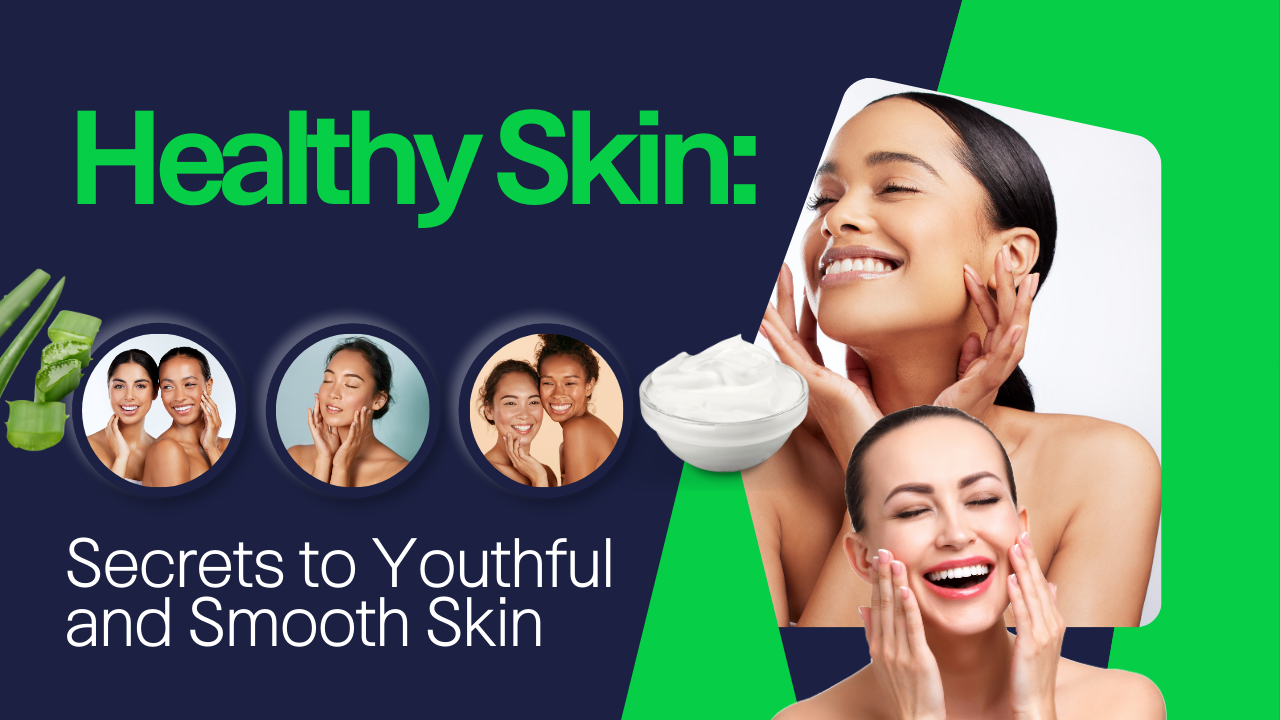Healthy, glowing skin is a reflection of not only beauty but also overall wellness. It’s the most visible part of our body and requires proper care, attention, and protection. Skin, as our largest organ, is constantly exposed to various environmental factors like UV rays, pollution, and harsh weather conditions, which can damage its texture and tone. Achieving and maintaining healthy skin involves a holistic approach that includes good skincare practices, a balanced diet, hydration, and consistent protection.
In this article, we’ll delve into 8 effective tips for healthy skin, highlighting key practices you can incorporate into your routine. These tips, backed by science and expert advice, will not only improve your skin’s appearance but also enhance its overall health. Whether you’re looking for anti-aging remedies, ways to reduce acne, or simply striving for a more even complexion, these tips will serve as a practical guide to radiant skin.
By the end of this article, you will have all the tools and knowledge to revamp your skincare regimen for a healthier, more glowing you.
Top Tips for Healthy Skin
Stay Hydrated
Proper hydration is one of the simplest and most effective ways to maintain healthy skin. Water helps flush out toxins and keeps skin cells plump, smooth, and youthful. Without adequate hydration, the skin can appear dull, tight, and flaky, making fine lines and wrinkles more noticeable. Drinking at least eight glasses of water each day provides the foundation for a glowing, vibrant complexion.
Beyond plain water, you can support healthy skin by including water-rich foods such as cucumbers, oranges, and watermelon. Herbal teas like chamomile and green tea add extra antioxidants while keeping your body hydrated. Coconut water and electrolyte drinks are also excellent for replenishing lost fluids after exercise or hot weather.
Consistent hydration aids cellular repair and regeneration, allowing your skin to recover quickly from environmental stress. Make it a habit to sip water throughout the day and enjoy herbal infusions that keep your body—and your healthy skin—balanced and radiant.
Benefits: Proper hydration helps keep your skin plump, smooth, and youthful. Dehydration can lead to dullness, dry patches, and fine lines.
Ingredients:
Water 💧
Herbal teas 🍵
Coconut water 🥥
Electrolyte drinks 🥤
Healthy skin keeping your skin hydrated isn’t just about drinking water—it’s also about maintaining a healthy fluid balance in the body. Dehydrated skin can appear flaky, tight, and less vibrant. Consuming water-rich foods like cucumbers, watermelon, and oranges also helps to nourish the skin from the inside out.
In addition, herbal teas like chamomile or green tea are great for skin hydration due to their antioxidant properties. Coconut water, packed with electrolytes, can provide an extra boost, ensuring your skin maintains its moisture balance. Drinking fluids regularly supports cellular repair and regeneration, which leads to a more radiant complexion.
Actionable Tip: Aim for at least 8 glasses of water a day. You can also include water-based foods in your diet to keep your skin looking fresh.
Follow a Consistent Skincare Routine
A daily skincare routine is critical for achieving and maintaining healthy skin. Cleansing removes dirt and excess oil, while toner balances pH levels to prepare your skin for better absorption of nutrients. Moisturizers lock in hydration and create a protective barrier, ensuring your skin remains soft and supple. The most important step is sunscreen, which protects against UV damage that causes premature aging and pigmentation.
Tailoring your skincare routine to your skin type is essential. Oily, dry, and combination skin each require specific cleansers and moisturizers to maintain healthy skin. Products containing vitamin C, hyaluronic acid, or retinol can target concerns like dullness, uneven tone, or fine lines, while non-comedogenic formulas prevent clogged pores.
Consistency is the key to results. Morning and evening routines help balance oil production, prevent breakouts, and keep your skin resilient. A simple regimen—cleanser, moisturizer, and sunscreen—forms the core of a routine that supports long-lasting healthy skin.
Benefits: A consistent skincare routine helps maintain your skin’s health by addressing issues like acne, aging, and uneven tone.
Ingredients:
Cleanser 🧴
Toner 🌿
Moisturizer 💧
Sunscreen 🌞
Consistency is key when it comes to skincare. Cleansing your face twice a day, using a toner to balance pH levels, and applying a good moisturizer are all essential steps. Don’t forget sunscreen—it’s one of the most effective ways to protect your skin from UV damage.
A routine should be tailored to your skin type—whether oily, dry, or combination. You should also focus on using non-comedogenic products that don’t clog your pores. Vitamin C serums, retinols, and exfoliating masks can all be great additions to your routine, depending on your needs.
Actionable Tip: Stick to a simple skincare regimen that includes a cleanser, moisturizer, and sunscreen. Add in serums or treatments as needed, but don’t overcomplicate your routine.
Eat a Skin-Friendly Diet
Your diet has a direct impact on healthy skin, as nutrients fuel cell renewal and protect against damage. Foods rich in omega-3 fatty acids, such as salmon and walnuts, help maintain skin hydration and elasticity. Antioxidant-packed berries fight free radicals, slowing the aging process and keeping skin firm. Leafy greens like spinach and kale provide vitamins A and C, which are essential for collagen production and natural glow.
Processed foods and refined sugars can lead to inflammation, acne, and premature wrinkles. To maintain healthy skin, focus on whole, nutrient-rich meals that supply the vitamins, minerals, and healthy fats your body needs. Hydrating foods like cucumbers and watermelon also contribute to skin moisture.
Creating balanced meals filled with colorful vegetables and fresh fruits not only supports your immune system but also ensures your skin remains radiant and youthful. A clean, nutrient-dense diet is the ultimate foundation for healthy skin from within.
Benefits: The foods you eat can have a profound impact on your skin’s health. A nutrient-rich diet can help reduce inflammation, improve elasticity, and prevent breakouts.
Ingredients:
Avocados 🥑
Berries (Blueberries, Strawberries) 🍓
Nuts (Almonds, Walnuts) 🌰
Leafy greens (Spinach, Kale) 🥬
A diet rich in vitamins, antioxidants, and healthy fats will nourish your skin from within. Omega-3 fatty acids found in fish like salmon and walnuts help maintain skin hydration. Antioxidants from berries combat free radicals that accelerate aging and damage the skin. Moreover, green leafy vegetables offer vitamins A and C, crucial for skin repair and collagen production.
Hydration through foods is also a key factor—cucumbers, watermelon, and celery help replenish water levels. Avoiding overly processed foods high in sugar or unhealthy fats can prevent skin flare-ups like acne or inflammation.
Actionable Tip: Incorporate a variety of colorful fruits and vegetables into your diet, focusing on those rich in antioxidants and healthy fats.
Get Enough Sleep
Quality sleep is vital for healthy skin because it is during deep rest that the body repairs and regenerates cells. While you sleep, collagen production increases, reducing the appearance of fine lines and maintaining firmness. Lack of sleep raises cortisol levels, which can trigger breakouts, dullness, and puffiness around the eyes.
Aiming for 7–9 hours of uninterrupted sleep each night allows your skin to fully recover from daily stress. Creating a calming nighttime routine—such as drinking chamomile tea or using lavender oil—prepares your mind and body for deeper rest. These habits help regulate hormones and protect the health of your skin.
With consistent sleep, you’ll notice brighter, smoother, and more resilient skin. Rest is not just about feeling refreshed—it’s a crucial investment in achieving youthful, healthy skin that glows naturally without heavy makeup or treatments.
Benefits: Sleep is essential for skin repair. During sleep, your body produces collagen and repairs skin cells, helping to reduce the appearance of fine lines and wrinkles.
Ingredients:
Lavender oil 🪴
Chamomile tea 🍵
Vitamin E 💊
Lack of sleep leads to an increase in stress hormones like cortisol, which can negatively affect your skin. Chronic sleep deprivation can cause dark circles, puffiness, and a dull complexion. Sleep allows the body to rest and regenerate, making it essential for skin health.
Getting 7-9 hours of quality sleep each night will not only make you feel more energized but will help reduce signs of aging. Lavender essential oil can help you relax, and chamomile tea can calm the mind before bed, setting the tone for a restorative night’s sleep.
Actionable Tip: Aim for 7-9 hours of sleep each night. Create a nighttime routine with calming activities like reading or taking a warm bath before bed.
Use Sunscreen Daily
Daily sunscreen application is non-negotiable for maintaining healthy skin. Harmful UV rays can penetrate clouds and windows, causing sunburn, pigmentation, and premature aging. Sunscreen acts as a protective barrier, shielding the skin from UVA and UVB rays that lead to dark spots and fine lines.
Choose a broad-spectrum sunscreen with SPF 30 or higher to ensure proper protection. Ingredients like zinc oxide or titanium dioxide provide physical blocking, while added antioxidants such as vitamin C can enhance defense against free radicals. Applying sunscreen every morning—even on cloudy days—is essential for healthy skin.
Regular use of sunscreen prevents photoaging and reduces the risk of skin cancer. Reapplying every two hours during outdoor activities keeps your skin safe and radiant. This simple daily habit will preserve youthful, healthy skin for years to come.
Benefits: Sunscreen protects against harmful UV rays, which can cause premature aging, pigmentation, and even skin cancer.
Ingredients:
Zinc oxide 🧴
Titanium dioxide 🌞
Vitamin C 🍊
UV radiation from the sun is one of the leading causes of skin damage. Even on cloudy days, harmful UV rays can penetrate your skin and cause long-term damage. Sunscreen protects your skin from these harmful effects, preventing sunburns and reducing the risk of skin cancer.
Sunscreens with broad-spectrum protection (against both UVA and UVB rays) and an SPF of 30 or higher are essential. Look for sunscreens that contain physical blockers like zinc oxide or titanium dioxide for added protection.
Actionable Tip: Apply sunscreen every morning, even if you’re staying indoors, as UV rays can penetrate windows.
Exfoliate Regularly
Exfoliation removes dead skin cells that dull the complexion, revealing smooth and healthy skin beneath. By clearing away debris, exfoliation improves texture, unclogs pores, and enhances the absorption of moisturizers and serums. Regular exfoliation encourages cell turnover, giving skin a brighter and more even tone.
You can exfoliate chemically using alpha-hydroxy acids (AHAs) or beta-hydroxy acids (BHAs), or physically with gentle scrubs like sugar or coffee grounds. Chemical exfoliants penetrate deeper to dissolve dead cells without causing microtears, making them ideal for sensitive skin.
Limit exfoliation to 2–3 times per week to avoid irritation. When done correctly, this step will leave your skin feeling soft, smooth, and refreshed, supporting the long-term goal of radiant and healthy skin.
Benefits: Exfoliation removes dead skin cells, revealing a smoother, more even complexion. It can also help reduce clogged pores and acne.
Ingredients:
Alpha-hydroxy acids (AHAs) 🍏
Beta-hydroxy acids (BHAs) 🍋
Sugar or coffee grounds ☕️
Exfoliation helps your skin shed the layer of dead skin cells that can make it look dull. Regular exfoliation improves texture, unclogs pores, and enhances the absorption of skincare products. You can exfoliate chemically with AHAs and BHAs or physically with scrubs.
Be cautious not to over-exfoliate, as it can lead to skin irritation. Opt for gentle exfoliants that won’t cause microtears in the skin.
Actionable Tip: Exfoliate 2-3 times per week with a gentle scrub or chemical exfoliant. Avoid harsh physical scrubs, which can be too abrasive for the skin.
Manage Stress
Chronic stress disrupts hormone levels, often resulting in acne, eczema, or premature aging. Managing stress is essential for maintaining healthy skin, as emotional balance helps reduce inflammation and breakouts. Stress-relief techniques like yoga, meditation, or mindful breathing help calm the nervous system and protect your skin’s natural glow.
Adaptogenic herbs such as ashwagandha and rhodiola may also support hormone balance and reduce the impact of stress on your complexion. Pairing these with daily relaxation practices strengthens both mental well-being and skin health.
Healthy skin incorporating stress-management habits ensures smoother, clearer, and more resilient skin over time. Reducing stress is not just a mental practice—it’s a powerful strategy for achieving consistently healthy skin.
Benefits: Chronic stress can lead to skin problems like acne, eczema, and psoriasis. Stress management helps maintain hormonal balance and supports skin healing.
Ingredients:
Ashwagandha 🌱
Rhodiola 🪴
Meditation 🧘♀️
Stress triggers the release of cortisol, a hormone that can cause inflammation and breakouts. Managing stress through relaxation techniques such as yoga, meditation, or even breathing exercises can benefit both your mental and skin health. Herbal supplements like ashwagandha and rhodiola are known for their adaptogenic properties, helping to balance stress hormones.
Actionable Tip: Incorporate stress-reducing activities into your daily routine, such as meditation or a nature walk. Practice deep breathing exercises during stressful moments.
Avoid Smoking and Limit Alcohol Consumption
Smoking and excessive alcohol intake are two of the biggest enemies of healthy skin. Smoking constricts blood vessels, depriving skin of oxygen and nutrients, which leads to premature wrinkles and dullness. Alcohol dehydrates the body, making the skin appear tired, puffy, and prone to breakouts.
Eliminating or reducing these habits allows your skin to heal and regain vitality. Hydrating with plenty of water and including vitamin C and E in your diet can help repair damage and restore natural radiance.
Quitting smoking and moderating alcohol is one of the most impactful steps you can take for healthy skin. With time, you’ll notice improved elasticity, better hydration, and a youthful glow that no skincare product can match.
Benefits: Smoking and excessive alcohol consumption damage the skin by reducing blood flow, depleting collagen, and leading to premature aging.
Ingredients:
Vitamin C 🍊
Vitamin E 💊
Water 💧
Smoking constricts blood vessels, reducing oxygen and nutrient flow to the skin, leading to dullness and wrinkles. Alcohol dehydrates the skin and exacerbates skin conditions like acne and rosacea. Reducing or eliminating these habits will significantly improve your skin’s health and appearance.
Incorporate vitamins like Vitamin C and E to support your skin’s ability to regenerate and recover. Hydrating regularly is also essential to counteract the dehydrating effects of alcohol.
Actionable Tip: Quit smoking and limit alcohol intake. Increase water consumption to help hydrate your skin.
Conclusion
Achieving healthy skin requires more than just using expensive products or following the latest beauty trends. True skin health comes from a holistic approach that nurtures the body inside and out. Hydration plays a vital role, as drinking enough water keeps the skin soft, supple, and glowing from within.
A proper diet rich in vitamins, minerals, and antioxidants supports cell repair and protects against premature aging. Foods like leafy greens, berries, nuts, and omega-3-rich fish provide essential nutrients that enhance skin elasticity and radiance. Consuming less sugar and processed foods also helps prevent breakouts and dullness.
Regular sleep is equally important, as the body repairs and regenerates skin cells during deep rest. Managing stress through meditation, exercise, or hobbies reduces hormone imbalances that can lead to acne, dryness, or redness, ensuring a calm and clear complexion.
Protective measures, such as applying sunscreen daily, shield the skin from harmful UV rays that cause wrinkles and dark spots. Consistency in these habits is key; healthy skin isn’t achieved overnight but through steady care, patience, and a balanced lifestyle.
FAQs
1: How often should I wash my face?
Answer:
You should wash your face twice daily—once in the morning and once before bed. Washing in the morning helps remove oil and sweat that build up overnight, while evening cleansing removes dirt, makeup, and pollutants from the day. Over-washing can strip the skin of its natural oils, so stick to two times unless you’ve been sweating heavily or wearing heavy makeup.
2: Is sunscreen really necessary even on cloudy days or indoors?
Answer:
Yes, absolutely! UV rays can penetrate through clouds and glass, meaning your skin is still exposed indoors and on overcast days. Wearing a broad-spectrum SPF 30 or higher daily is essential to prevent premature aging, pigmentation, and skin cancer. Make it a habit, just like brushing your teeth.
3: Can my diet really affect my skin health?
Answer:
Yes, what you eat plays a big role in your skin’s condition. Fruits, vegetables, healthy fats, and plenty of water support clear, glowing skin, while excess sugar, dairy, and processed foods can trigger breakouts and dullness. A balanced, antioxidant-rich diet promotes collagen production and reduces inflammation.
4: How does sleep impact my skin?
Answer:
Sleep is when your skin enters repair mode. During deep sleep, your body boosts collagen production, reduces inflammation, and improves blood flow to the skin, leading to a glowing complexion. Poor sleep, on the other hand, can cause dark circles, puffiness, and premature aging. Aim for 7–9 hours of quality sleep each night.
5: What’s the most important tip for healthy skin?
Answer:
While all tips are important, the most critical is to stay consistent. A balanced skincare routine, daily sun protection, hydration, and a nutritious diet—when practiced regularly—deliver the best long-term results. Quick fixes rarely work, but consistency pays off with healthier, younger-looking skin over time.

